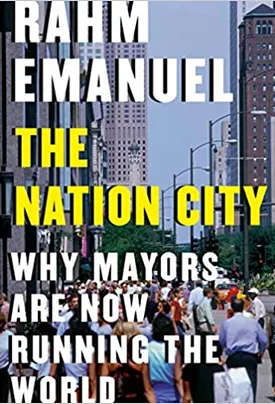The Nation City: Why Mayors Are Now Running the World by Rahm Emanuel
In his recently published book, “The Nation City: Why Mayors Are Now Running the World”, Chicago mayor Rahm Emanuel provides an intimate look into how cities are leading the charge in tackling global problems. Emanuel argues that mayors across the world are becoming more influential in the pursuit of global progress, taking the lead role in developing meaningful solutions for tough policy issues.
Emanuel outlines the changing dynamics of the modern global order, arguing that nation-states are increasingly unable to address global problems. Global trade, immigration, and the climate crisis are problems that can no longer be solved simply by government policy, but instead require collaborative action from cities, private companies, NGOs, and other actors. In this new world, mayors and cities have become the new centers of gravity. They are the conduits between global forces and the local populations they serve, and are often in a unique position to achieve the pragmatic solutions needed to confront global challenges.
Emanuel goes on to explain how the role of the mayor is shifting to become the center of effective urban policy. He details a number of case studies illustrating mayors who have taken on large-scale projects and seen positive results, such as former New York City Mayor Michael Bloomberg’s efforts to reduce emissions and improve air quality in the city. Emanuel further outlines the vital role mayors play in leveraging the resources of the private sector to effect change. He notes that mayors have access to the largest public works departments and the ability to draw private capital into cities to fund projects, often in ways that circumvent traditional government bureaucracy.
The book also takes into consideration the difficulties that mayors can face in trying to make an impact, such as a lack of political power or limited resources. Emanuel acknowledges the need for mayors to work with state and federal governments, but insists that mayors ultimately have the ability to shape their own destiny. He draws attention to the importance of vision and the power of local coalitions working together to achieve shared goals. By leveraging the resources of these communities and collaborating across government, mayors can make system-wide changes that will benefit the entire city.
At the heart of the book is the belief that mayors can be forces for meaningful change, and that cities and states can solve complex global issues in ways that are more efficient, creative, and democratic than larger forms of government. Emanuel shows us that cities are often the most innovative locus of activity, and can be leveraged to find meaningful solutions that take into account wider global problems. By explaining the changing roles of leaders in the globalized world, Emanuel provides fresh insight into how cities can be crucial players in creating a better future for all.

